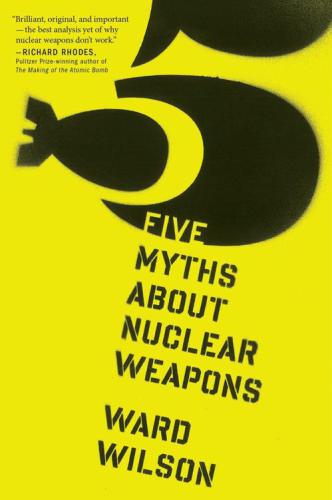
Five Myths About Nuclear Weapons
- اطلاعات
- نقد و بررسی
- دیدگاه کاربران
نقد و بررسی

Starred review from December 24, 2012
In this concise analysis of commonly held beliefs about nuclear weapons, Wilson argues that, from the bombing of Hiroshima, policy has been decided based on mistaken suppositions. The first is that the dropping of atomic bombs caused Japan to surrender, rather than the invasion of Manchuria by the formerly neutral Russians. This convenient lie was agreed to by both sides for propaganda purposes. Therefore, according to Wilson, the myth was born that nuclear weapons are so devastating that their existence prevents their use. He points out, with examples, that "destruction does not determine who wins or loses a war." The Cuban Missile Crisis is considered not as proof of the myth but as a negation of it. Another myth Wilson debunks is that the fear of nuclear catastrophe has prevented World War III. He concludes by asking for a revision of attitude because as long as nuclear bombs are viewed as a deterrent to war, nuclear weapons will proliferate. When these myths are extinguished, he contends, nuclear weapons can be discarded as a dangerous tool that is ineffective for the task. Wilson's theories are certain to create discussion and a reevaluation of assumptions on the topic. Agent: Martha Kaplan, Martha Kaplan Agency.

Starred review from January 1, 2013
A compelling, plainspoken piece of advocacy in which the author maintains that everything we think we know about nuclear weapons is wrong. Though Wilson stops just short of making the case for immediate and unilateral nuclear disarmament, he builds a methodical, step-by-step argument that the very notion of such weapons as a deterrent is fallacious, based on a misunderstanding of when and why Japan decided to surrender in the wake of the bombing of Hiroshima. What makes his case so convincing (though not all will be convinced) is that he makes it not in the spirit of Utopian idealism, but fact-facing pragmatism. He argues that most of the support for nuclear weaponry is in fact irrational, based on the misconception that mankind has no control over the future--that, having opened the Pandora's box of nuclear technology, we live in fear of apocalypse. The fallacy begins with the bombing of Japan, where "the danger is that we have overinflated their value [of nuclear weapons] by misinterpreting that one event." The threat of Russian invasion, not the nuclear bombing, forced Japan's hand--"the atomic bomb swept all mistakes and misjudgments under the rug." If it didn't end a war, as generally perceived, neither has it stood as a deterrent, with Wilson citing the Cuban missile crisis as a sign of recklessness that actually pushed us closer to war. Yet even if one agrees with every one of his points, the author admits that "I am not sure what can and should be done with nuclear weapons." He offers the plea that "the wisest scholars need to be enlisted to go back over the problem." A provocative reframing of a problem that still awaits a solution.
COPYRIGHT(2013) Kirkus Reviews, ALL RIGHTS RESERVED.




دیدگاه کاربران